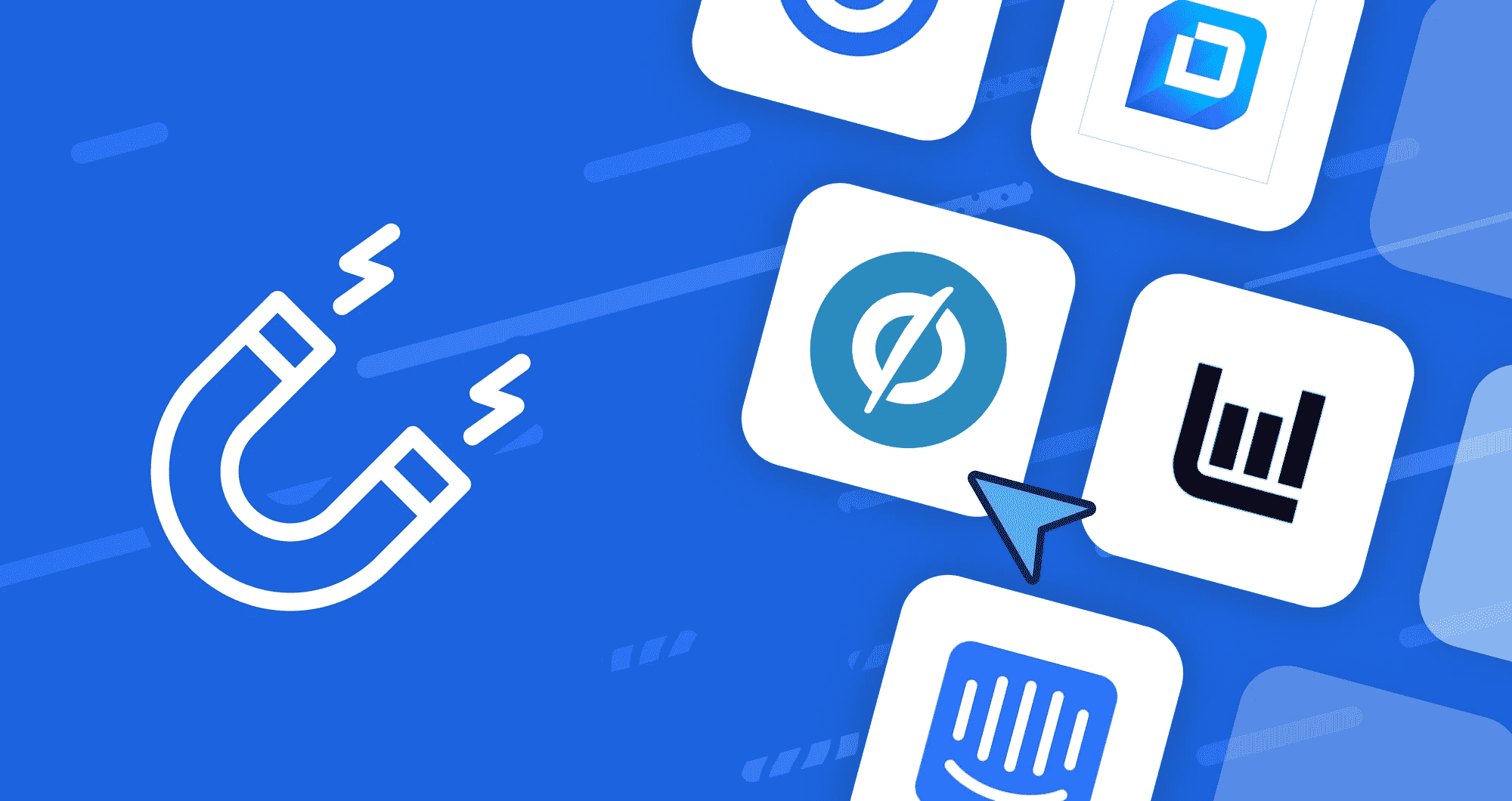In today’s fast-paced world of digital marketing, lead generation remains a crucial part of any successful business strategy. How well you can attract, capture, and nurture leads can have a big impact on your bottom line.
But with so many lead generation tools available, picking the right one for your business can be challenging.
This blog will explore the top lead-generation tools and help you decide which ones are worth your investment.
Introduction to Lead Generation Tools
Software or platforms that help companies gather and organize the contact details of potential clients are known as lead-generating tools.
The process of finding prospects, guiding them through the sales funnel, and finally turning them into devoted clients is made easier by these technologies. Using the correct lead-generating tools can help your marketing campaigns and increase sales, regardless of the size of your business.
The Importance of Choosing the Right Tool
Your marketing ROI is directly impacted by the lead-generating technology you choose, so making the appropriate investment is essential.
A carefully selected tool saves time and resources by automating multiple tasks in addition to assisting in the identification of excellent leads. On the other hand, a badly chosen tool may result in lost time, missed chances, and a large financial loss.
Top Lead Generation Tools to Consider
Here, we’ll compare some of the top lead generation tools available, evaluating their features, pricing, and overall effectiveness. The tools are categorized based on different lead generation strategies such as email marketing, social media, content marketing, and CRM integration.
1. HubSpot
Overview:
HubSpot is a comprehensive inbound marketing platform. It includes tools for lead creation, customer relationship management (CRM), email marketing, and more. Its powerful capabilities and user-friendly interface are generally acknowledged.
Key Features:
- CRM Integration: Manage and nurture leads with ease using HubSpot’s CRM integration.
- Email marketing: Consistent follow-ups using automated email campaigns.
- Lead scoring: An automatic ranking system that considers the engagement and behavior of leads.
- Landing Pages: Lead generation tools with customizable landing page layouts.
- Analytics: Comprehensive data to monitor the effectiveness of your lead creation initiatives.
Pricing:
- Free Plan: Basic CRM and lead generation features.
- Starter Plan: $45/month, includes more advanced features.
- Professional Plan: $800/month, for growing businesses.
- Enterprise Plan: $3,200/month, tailored for large enterprises.
Pros:
- All-in-one platform.
- Excellent client support.
- Scalable for businesses of any size.
Cons:
- Pricing might be expensive for small businesses.
- Some advanced features can be learned.
2. Mailchimp
Overview:
Mailchimp is a prominent email marketing solution noted for its ease of use and robust automation features. It is great for firms who want to capture leads via email campaigns and newsletters.
Key Features:
- Email Campaigns: User-friendly email builder with drag-and-drop capabilities.
- Automation: Advanced workflows for lead nurturing.
- Audience segmentation: Refer to targeted email campaigns based on user behavior and preferences.
- Landing Pages: Use landing pages to collect leads directly from your website.
- Reporting: Include detailed information on campaign performance.
Pricing:
- Free Plan: Up to 2,000 contacts and basic features.
- Essentials Plan: $13/month, includes A/B testing and custom branding.
- Standard Plan: $20/month, advanced segmentation and automation.
- Premium Plan: $350/month, for advanced analytics and support.
Pros:
- User-friendly interface.
- Affordable for small enterprises.
- Robust automation features.
Cons:
- Limited CRM functionality.
- Not suitable for huge organizations.
3. Leadfeeder
Overview:
Leadfeeder is a lead generation technology that identifies and tracks website visitors’ behavior. It enables businesses to understand who is visiting their website, even if they do not complete a form, and provides insights for follow-up.
Key Features:
- Visitor Tracking: Identifies the companies that visit your website.
- CRM Integration: Integrates seamlessly with major CRMs such as HubSpot and Salesforce.
- Lead Scoring: Sorts leads according to their activity on your website.
- Custom Feeds: Filter leads according to customized parameters.
Pricing:
- Lite Plan: Free with limited features.
- Premium Plan: Starts at $63/month, with advanced features.
Pros:
- Perfect for B2B enterprises.
- Detailed visitor insights.
- Simple integration with other tools.
Cons:
- Limited ability to trace website visitors.
- Prices are higher for smaller firms.
4. OptinMonster
Overview:
OptinMonster is a robust lead generation tool that focusses on creating opt-in forms and pop-ups to gather leads on your website. It is particularly beneficial for e-commerce enterprises and bloggers.
Key Features:
- Drag-and-Drop Builder: Easy creation of pop-ups, slide-ins, and other opt-in forms.
- Targeting and Personalization: Show forms based on user behavior, location, and device.
- A/B Testing: Test different forms to see which performs best.
- Analytics: In-depth analytics to track the performance of your forms.
Pricing:
- Basic Plan: $9/month for one site.
- Plus Plan: $19/month for three sites.
- Pro Plan: $29/month for five sites.
- Growth Plan: $49/month for unlimited sites.
Pros:
- High conversion rates.
- Easy to use with no coding required.
- Integrates with most email marketing platforms.
Cons:
- Limited to website forms and pop-ups.
- Pricing increases with additional features.
5. LinkedIn Sales Navigator
Overview:
LinkedIn Sales Navigator is a premium tool designed for B2B lead generation on LinkedIn. It provides advanced search filters and insights to help businesses connect with potential leads on the platform.
Key Features:
- Advanced Search: Filter potential leads by industry, company size, role, and more.
- Lead Recommendations: Personalized lead suggestions based on your preferences.
- InMail: Send direct messages to leads, even if you’re not connected.
- CRM Sync: Integrates with major CRMs to manage leads effectively.
Pricing:
- Professional Plan: $79.99/month, tailored for individual users.
- Team Plan: $134.99/month, for small teams.
- Enterprise Plan: Custom pricing for large organizations.
Pros:
- Ideal for B2B lead generation.
- Extensive network and professional data.
- Powerful search and filtering options.
Cons:
- Expensive compared to other tools.
- Best suited for LinkedIn-focused strategies.
6. Pardot by Salesforce
Overview:
Pardot is a marketing automation tool by Salesforce designed for B2B lead generation. It offers advanced features for lead nurturing, email marketing, and ROI tracking.
Key Features:
- Lead Scoring: Automatically scores leads based on their interactions.
- Email Marketing: Create personalized email campaigns with automation.
- CRM Integration: Deep integration with Salesforce CRM for seamless lead management.
- ROI Reporting: Track the effectiveness of your campaigns in real-time.
Pricing:
- Growth Plan: $1,250/month, for up to 10,000 contacts.
- Plus Plan: $2,500/month, includes advanced automation.
- Advanced Plan: $4,000/month, for large enterprises with custom needs.
Pros:
- Excellent for B2B marketing.
- Powerful automation features.
- Deep Salesforce integration.
Cons:
- High cost, especially for small businesses.
- Complex setup and learning curve.
7. Apollo
Overview:
Apollo is a comprehensive sales intelligence and lead generation platform that is ideal for businesses looking to enhance their outbound marketing efforts.
It combines robust data sourcing with multi-channel outreach, making it an essential tool for sales teams aiming to find, engage, and convert leads. Apollo is particularly popular among B2B companies due to its vast database and advanced search capabilities.
Key Features:
- Extensive Database: Access to over 200 million contacts and 10 million companies, allowing for highly targeted lead generation.
- Advanced Search and Filtering: Filter leads based on various criteria such as industry, company size, location, and job title.
- Multi-Channel Outreach: Automate email campaigns, phone calls, and LinkedIn messages to engage leads across different platforms.
- CRM Integration: Seamless integration with popular CRMs like Salesforce, HubSpot, and more for streamlined lead management.
- Engagement Tracking: Monitor the engagement of your leads with your outreach efforts and track their progress through the sales funnel.
Pricing:
- Free Plan: Basic access with limited features and credits.
- Basic Plan: $49/month, includes more credits and access to premium features.
- Professional Plan: $99/month, offers enhanced automation and additional credits.
- Organization Plan: Custom pricing for enterprises with advanced needs and higher usage requirements.
Pros:
- Extensive contact and company database.
- Highly customizable and detailed search filters.
- Integration with major CRMs and multi-channel outreach.
- Cost-effective for small to mid-sized businesses.
Cons:
- The learning curve for new users is due to its comprehensive features.
- Higher tiers may be expensive for small businesses with limited budgets.
How to Choose the Right Tool for Your Business
When choosing a lead generation tool, consider the following factors:
1. Business Size and Needs
Small businesses may benefit from more affordable, user-friendly tools like Mailchimp or OptinMonster, while larger enterprises might require the advanced features of HubSpot or Pardot.
2. Integration Capabilities
Ensure the tool you choose integrates well with your existing CRM, email marketing platforms, and other digital marketing tools.
3. Budget
While some tools offer free versions, advanced features often come at a premium. Evaluate your budget and choose a tool that provides the best ROI.
4. Ease of Use
If you’re new to lead generation tools, opt for a platform with a simple interface and robust customer support.
5. Target Audience
B2B businesses might prioritize LinkedIn Sales Navigator or Leadfeeder, while B2C companies could benefit more from tools like OptinMonster or Mailchimp.
Conclusion: Making the Right Investment
Investing in the right lead-generation tool can significantly enhance your marketing efforts and lead to better conversion rates. By understanding your business needs and comparing the features, pricing, and benefits of each tool, you can make an informed decision that drives your business forward.
Ready to boost your lead generation efforts? Start by exploring the tools mentioned above and choose the one that best aligns with your business goals. Need more personalized advice? Contact us today, and let’s discuss how we can optimize your lead generation strategy together!
FAQs
1. What is a lead generation tool, and why do I need one?
A lead-generating tool is software that allows organizations to attract, capture, and manage potential customers’ contact information. It simplifies the process of discovering prospects and guiding them through the sales funnel, which is critical for increasing sales and expanding your organization.
2. Can I use more than one lead generation tool simultaneously?
Yes, a lot of companies target different stages of the customer journey with different lead generation technologies. For instance, you could use Mailchimp for email marketing campaigns and OptinMonster to collect leads from visitors to your website.
3. Are there any free lead generation tools available?
Indeed, a number of lead creation solutions, such as HubSpot, Mailchimp, and Leadfeeder, have free versions available. As your needs increase, you might need to change to a paid plan because these free plans frequently have limited capabilities.
4. How do I measure the effectiveness of a lead generation tool?
Metrics like conversion rate, lead quality, ROI, and client acquisition cost can be used to gauge effectiveness. To assist you in tracking these indicators, the majority of lead creation solutions offer analytics and reporting functionality.
5. Which lead generation tool is best for a small business?
Because of their price, usability, and abundance of features, platforms like Mailchimp, OptinMonster, and HubSpot’s free plan are perfect for small businesses. With little to no cash outlay, you may increase your lead generation with the aid of these tools.



